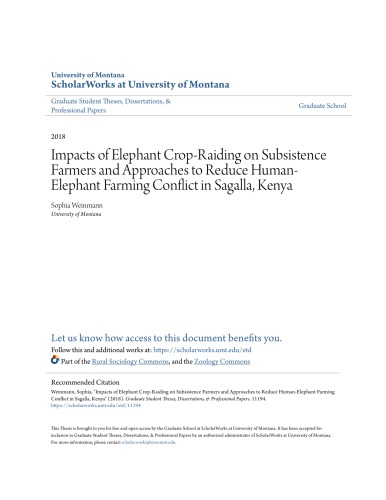Product desciption
Impacts Of Elephant Cropraiding On Subsistence Farmers And Approaches To Reduce Human Elephant Farming Conflict In Sagalla Kenya Sophia Weinmann by Sophia Weinmann instant download after payment.
As human and elephant populations grow in Kenya, elephants increasingly leave parks to eat farmers’ crops while foraging, which creates epicenters of human-elephant conflict (HEC). This conflict compromises farmers’ food and economic security, impedes elephant conservation initiatives, and threatens the safety of humans and elephants. In recent years, the situation has been exacerbated by drought and national-level infrastructure development that bisects key elephant habitat. Although researchers have widely studied elephant populations, few have examined the cultural, economic, and emotional effects of HEC on subsistence farmers. This project utilized a mixed methods approach to address this knowledge gap and understand the lived experiences of Wasaghala farmers in Lower Sagalla, Kenya. These farmers live adjacent to Kenya’s largest elephant population in Tsavo East National Park and regularly experience elephant crop-raiding. This research was conducted in partnership with Save the Elephants, a non-profit that studies elephant-crop raiding in Lower Sagalla. This project complements their research by facilitating greater understanding of complex human-elephant interactions and providing insight into the role that agricultural crops play in elephant crop-raiding. Personal interviews were conducted with a purposefully chosen sample of farmers, community leaders, and regional experts to understand their perspectives on cultural, agricultural, and economic dimensions of HEC in Lower Sagalla. Topics covered included regional history of HEC, impacts on farmers, elephant deterrent strategies, and farmer agricultural decision-making. Additional data were collected from an on-farm experiment that examined how crop palatability impacts elephant crop-raiding behavior. It aimed to determine if moringa and sunflowers are less palatable to elephants than maize, and if growing these crops can reduce crop loss due to elephant crop-raiding. Results from all data concluded that HEC creates widespread suffering for farmers in Lower Sagalla, that they are unable to adequately address this issue on their own, and that there is a need for the development of novel HEC mitigation strategies. Additionally, results suggest that crop palatability influences elephant crop-raiding behavior and that growing crops that are less palatable to elephants, but beneficial to farmers, may play a role in reducing crop loss and increasing farmers’ economic and food security. The research concludes with management recommendations to reduce elephant crop-raiding and improve human-elephant co- existence.
---
Thesis presented in partial fulfillment of the requirements for the degree of Master of Science In Resource Conservation, International Conservation and Development, The University of Montana Missoula, MT.


